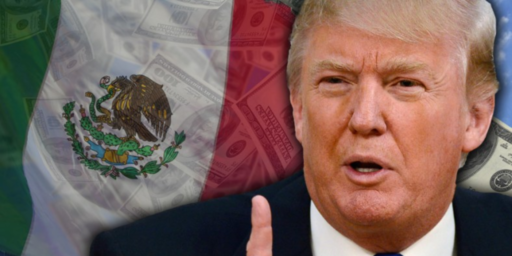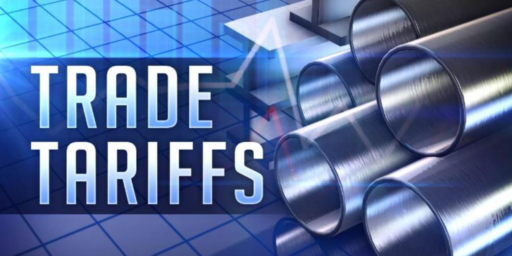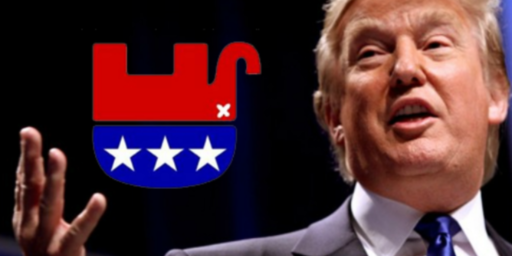U.S. And Mexico Reach Deal To Avert Tariffs, For Now
The United States and Mexico reached a last-minute deal to avert tariffs that would have gone into effect on Monday. Whether the deal accomplishes anything substantive remains to be seen.

Late yesterday, the United States and Mexico reached an agreement to avert the imposition of tariffs on goods from Mexico unless that country agreed to take steps to avert the tide of migrants coming from Central American hoping to reach the border with the United States to claim asylum as provided by Federal law and international treaties to which the United States is a signatory:
WASHINGTON — President Trump backed off his plan to impose tariffs on all Mexican goods and announced via Twitter on Friday night that the United States had reached an agreement with Mexico to reduce the flow of migrants to the southwestern border.
Mr. Trump tweeted the announcement only hours after returning from Europe and following several days of intense and sometimes difficult negotiations between American and Mexican officials in Washington.
The president’s threat that he would impose potentially crippling tariffs on the United States’ largest trading partner and one of its closest allies brought both countries to the brink of an economic and diplomatic crisis — only to be yanked back from the precipice nine days later. The threat had rattled companies across North America, including automakers and agricultural firms, which have built supply chains across Mexico, the United States and Canada.
Businesses had warned that the tariffs would increase costs for American consumers, who import everything from cucumbers to refrigerators from Mexico, and prompt retaliation from the Mexican government in the form of new trade barriers that would damage the United States economy.
But the trade war ended before it began, forestalling that economic reckoning and an intraparty war that Mr. Trump had created by threatening tariffs to leverage the immigration changes he demanded.
That tactic had drawn stiff protests from Republicans, including many senators, who have long opposed tariffs and worried the measure would hurt American companies and consumers.
In an unusual show of force against their own party’s president, Republican senators had threatened to try to block the tariffs if Mr. Trump moved ahead with them, and had demanded a face-to-face meeting with the president before any action.
For Mexico, the president’s threat was a replay of past episodes in which Mr. Trump ranted about the country’s lack of immigration enforcement.This year, he threatened to shut down the entire southwestern border, backing off only after aides showed him evidence that Mexican authorities were taking aggressive action to stop migrants.
This time, Mexican authorities were under similar pressure to find something that would mollify Mr. Trump.
According to a United States-Mexico Joint Declaration distributed late Friday, Mexico agreed to “take unprecedented steps to increase enforcement to curb irregular migration,” including the deployment of its national guard throughout the country to stop migrants from reaching the United States.
The declaration, distributed by the State Department, said Mexico had also agreed to accept an expansion of a Trump administration program that makes some migrants wait in Mexico while their asylum claims are heard in the United States.
“The United States looks forward to working alongside Mexico to fulfill these commitments so that we can stem the tide of illegal migration across our southern border and to make our border strong and secure,” Secretary of State Mike Pompeo said in a statement.
But the declaration by the two countries included an ominous warning, as well, stating that if Mexico’s actions “do not have the expected results,” additional measures could be taken. The declaration said the two countries would continue talking about other steps that could be announced within 90 days.
Mr. Trump’s lashing out at Mexico last week grew out of his deepening frustration with the surge of migrants that have been arriving at the border, many of them families with children from Central America who are fleeing violence and economic distress in their home countries.
Mr. Trump views the increase in immigration as a direct assault on his political brand and the promises that he made while running for president. He vowed to build a wall along the border and eliminate illegal immigration — two pledges that he has largely failed to deliver as president.“The Tariffs scheduled to be implemented by the U.S. on Monday, against Mexico, are hereby indefinitely suspended,” Mr. Trump wrote just before 8:30 p.m. “Mexico, in turn, has agreed to take strong measures to stem the tide of Migration through Mexico, and to our Southern Border.”
It was not immediately clear how quickly the agreement would be carried out and whether it would work to reduce the number of migrants flowing into the United States. But the outcome prevents a trade war that experts from both countries had warned could have been an economic catastrophe on both sides of the border.
Trump administration officials demanded that Mexico support changes in asylum rules that would allow the United States to more readily reject asylum seekers from Guatemala, Honduras and El Salvador. Mexico has for years resisted such a demand out of concerns about the political and economic cost.
In the agreement reached Friday, Mexico did not assent to those changes. Instead, its government agreed to increase participation in a Trump administration program called the Migrant Protection Protocols, in which some migrants are sent to wait in Mexico while their asylum claims in the United States are processed.
Martha Bárcena, the Mexican ambassador to the United States, wrote Friday evening on Twitter that her government had agreed to “strengthen measures for the application of its immigration law.”
In particular, she said that Mexico would provide health, education and employment opportunities to migrants who are waiting in Mexico while they seek asylum in the United States.That should allow the Trump administration to expand the Migrant Protection Protocols program, though it was not immediately clear how the new Mexican promises of cooperation would radically change the situation that already exists.
Mexico had in the past resisted making a formal bilateral agreement about the program, but had informally agreed to provide similar assistance to the migrants while they waited in Mexico. There are already about 8,000 migrants waiting there.
Civil rights groups in the United States have challenged the program, saying that it violates the rights of the migrants who are sent to wait in Mexico by depriving them of access to lawyers who could help them with their claims. A federal judge initially blocked the program, but an appeals court let the Trump administration move forward with it while the legal challenge was heard.
“The Trump administration announced that it intends to further expand its forced return to Mexico policy, which has been illegal since Day 1 and has already proven to be a disaster,” Omar Jadwat, the director of the American Civil Liberties Union’s Immigrants’ Rights Project, said Friday night. “We continue to press our legal challenge to the policy.”
Ms. Bárcena also wrote that there would be renewed “cooperation for the development and prosperity of southern Mexico and Central America.” Mexico has long pushed for the United States to invest more in helping the region economically.
(…)
The agreement that Mr. Trump announced ended — at least for now — an escalation of the trade wars that the United States has waged against other countries, like China.
The new levies would have raised the cost of a wide array of products imported from Mexico, including cars, cucumbers, bluejeans, packaged food and chemicals. Mr. Trump had warned that he was prepared to ramp tariffs up each month until they hit 25 percent in October.
That would have been a drastic cost increase for the United States’ current largest trading partner, one that could have significantly increased prices for American consumers and ruptured long-established supply chains.
More from The Washington Post:
President Trump announced Friday night that a deal was in place that would avert threatened tariffs on imports from Mexico in exchange for that country’s taking “strong measures” to curb the influx of Central American migrants at the U.S. southern border.
The agreement, which came just two days before Trump had vowed to impose a 5 percent, across-the-board tariff on one of the United States’ top trading partners, called for the Mexican government to widely dispatch its national guard forces to help with immigration enforcement, with priority in the south, on its border with Guatemala, according to a joint statement.
In addition, the two countries would expand a program known as the Migrant Protection Protocols (MPP), created this year, that allows the United States to return Central American migrants to Mexico while they await the adjudication of their asylum hearings in U.S. immigration court, a process that can take months.
The expansion of the program could result in tens of thousands of migrants waiting in limbo in potentially unsafe conditions in Mexico. MPP already has faced legal challenges, and while a federal appeals court panel in San Francisco has allowed it to temporarily continue while it reviews the policy, some judges have indicated that the MPP program might not be constitutional.
“I am pleased to inform you that The United States of America has reached a signed agreement with Mexico,” Trump wrote on Twitter. “The Tariffs scheduled to be implemented by the U.S. on Monday, against Mexico, are hereby indefinitely suspended. Mexico, in turn, has agreed to take strong measures to stem the tide of Migration through Mexico, and to our Southern Border.”
Mexican President Andrés Manuel López Obrador tweeted about the deal shortly after Trump, adding that he would still hold a planned rally in Tijuana on Saturday meant to “defend the dignity of Mexico.”
“Thanks to the support of all Mexicans, the imposition of tariffs on Mexican products exported to the United States was avoided,” he wrote.
At the State Department, Mexican Foreign Minister Marcelo Ebrard told reporters that the deal did not include a provision pushed by the Trump administration, known as a “Safe Third Country” agreement, that would have required asylum seekers to apply for refugee status in Mexico before reaching the United States, since it also is considered safe for asylum purposes.
“I think it is a fair balance because they had more drastic measures and proposals at the start and we reached a midpoint,” Ebrard said.
Here are the tweets the President sent announcing the deal as well as several tweets from this morning where he talked more about the agreement:
The agreement came at nearly the eleventh hour, just hours before the President was set to sign the Executive Order that would have put the tariffs in place beginning on Monday (although there had been some suggestion late in the day that the execution of that order could be delayed if it appeared that the parties were close to a deal. Additionally, the announcement came just about a week after the President had first announced the tariffs on the eve of his visit to Europe for the D-Day anniversary and State Visit to the United Kingdom. In the wake of that announcement, the reaction on both sides of the border was overwhelmingly negative, with even many of the Republican allies in the Senate threatening to break with him over the issue due to the impact that it could have on the U.S. economy as a whole and their home states in particular. The Senators on that list included people who are ordinarily staunch Trump loyalists such as Senators Ted Cruz and John Corburn, both of Texas, a state that would have been particularly hard hit by the tariffs.
Despite the criticism, though, the President and the Administration pressed forward with their insistence that the tariffs, which everyone agreed would significantly harm the U.S. economy if fully implemented, would go forward unless Mexico agreed to American demands. In an effort to avert that prospect, Mexican and American officials began talks in Washington on Wednesday in an effort to reach a deal that would avert a potentially costly trade war that would harm the economies of both nations. At times during the week, it appeared from word leaking out from the White House that the parties were too far apart and that a deal might not come in time to avert tariffs being imposed beginning on Monday. Other reports suggested that a deal was unlikely until after the President returned to the United States, which happened early on Friday as the third day of negotiations was beginning. As it turned out, that wasn’t the case and that, at least for now, the President will not follow through on his threats.
As with anything such as this, the devil is in the details and those details, listed in a joint statement posted on the State Department’s website are far from clear on several important points. For example, it is unclear exactly what measures the United States will use to determine if Mexico is doing enough to stop the flow of migrants and what might happen if that goal isn’t reached, or if the President decides on a whim to churn the immigration waters again by putting the tariffs back on the table. Additionally, as Kevin Drum observes, there really isn’t much to the agreement:
Unless I’m missing something, there’s not much here. The first point is something that Mexico says it’s already been doing for months. American officials initially dismissed it as little more than hot air, but now it’s the heart of the agreement. What changed?
As for the Migrant Protection Protocols, which allow border authorities to return asylum seekers to Mexico while they await a court hearing, they were implemented last December in San Diego, with plans to roll them out across the border over time. So is there anything new here, aside from the fact that Mexico is accepting the program formally, rather than pretending to oppose it while quietly cooperating? I can’t tell. It’s possible that “entire Southern Border” literally means the entire border, not just ports of entry, which I think would be new. But that’s not clear. In any case, this is an American program that Mexico has already tacitly accepted, not anything new that Mexico is doing to rein in the flood of asylum seekers from Guatemala and other countries.
In brief, then: Mexico has agreed to (a) maintain some vaguely defined law enforcement actions and (b) formally accept an American program that they were already cooperating with quietly. That’s it. But it was enough to buy off Trump. He’s a cheap date, I guess.
The other part of the agreement appears to be that Mexico has agreed to do more to stem the tide of Central American migrants, including measures to strengthen forces at its own southern border and the deployment of Mexican National Guard forces in areas of the country that these migrant caravans have traveled through in the past. Again, though, the agreement does not appear to include any numerical goal or other measures to determine whether the efforts are succeeding. Indeed, from the text of the document, it appears that the only real measure of success or failure is the whim of the President on a day-to-day basis.
Despite all of that, the President and his supporters will no doubt claim this as a victory for the President and, at least on paper, I suppose you can give them that much. That being said, these tariffs were an insane idea from the moment they were announced. Had even the first round been implemented on Monday it would have been a significant disruption to trade in areas that encompass a vast majority of the American economy, including everything from agriculture and the auto industry to consumer goods and parts for automobiles, appliances, and factory equipment. Had the full measure of tariffs been implemented by October, which would have increased the tariffs to 25%, it would have been utterly disastrous. So you want to give the President credit for not implementing monumentally stupid tariffs that would have significantly harmed the economy then I suppose it’s appropriate to do so






Alternative headline: In the Face of Really Shitty Jobs Numbers, trump Folds Like a Cheap Suit
As always: trump creates “crisis”. trump “solves crisis”. trump calls it “Greatest Deal in the History of Deals”.
Wash, rinse, repeat.
@OzarkHillbilly:
Not quite.
Trump pretend to solve his “crisis” by saying “Trump Solve Crisis! Best crisis solvent ever!!1!” and the deplorables eat his bull**t with a large spoon.
The withdrawal of the tariff threat is not a good thing at all. If el peje had the brains and courage he claims to have, he’d have send Ebrard to say “Sure. we’ll step up. How much will you pay us for that?”
From the NYT write-up:
All of this really is reality TV brought to governance. It is all show and noise, but ultimately amounting to nothing.
I’m sure the business community loves random whiplashing uncertainty.
I’m disappointed that Mexico saw fit to negotiate with a terrorist.
Seriously, Trump is threatening Mexico with tariffs if they don’t “solve” a problem that he created, specifically by slow-walking asylum petitions.
First, he ended the ability of (say Guatemalan’s) to apply for US asylum while still in Guatemala, the consequence of that action was to force Guatemalan’s to traverse Mexico in order to be physically present in the US. – Then he sheds his crocodile tears for those families who may be placed at risk of violence while seeking to present themselves in the US.
Then he claims ” the US is full” – can’t admit anyone because ‘there no room in the inn’. (While simultaneously admitting the elite as long as they are super educated, privileged, and preferably Norwegian) – So much for the “we are full – can’t make room for anyone else”
Just as any other negotiation with a bully proceeds – Trump has now learned that he can threaten Mexico with a tariff any time he chooses to accede to his unrelated desires.
@Steven L. Taylor:
In this case, that would be a good thing. So I hope you’re right.
I can’t help but think that the White House had this deal in place prior to Trump’s tweet, which was tossed out there to create the appearance that Mexico was caving to Trump’s threats. I know… call me cynical.
Seen in a Facebook thread:
see you thought people were leaving Guatemala and Honduras and walking 2,000 miles to get away from murderous gangs threatening their families, but in reality George Soros and Tom steyer are down there handing out checks. 😛 😛 😛
I for one will be sleeping much better tonight knowing that Mr. Trump has gotten six thousand Mexican soldiers to guard us. They will be well equipped but won’t need badges because (say it with me) they are federales.
Did the NK nuclear deal need to accomplish anything substantive? Did the Obamacare replacement need to accomplish anything substantive? Did the tax cuts? Did the trade war? Putting kids in
cagessummer camp-like settings? Separating families? You’re asking the wrong question with the wrong goal in mind.I like Schumer’s take:
@Teve: Nic Kristof has a more credible explanation in his column titled with a quote,
@gVOR08: As sad as Mrs. Jorge Jorge’s story is, I find that I must put on my Libertarian/Objectivist hat and simply note that if she had only decided to be born in a better place than a Guatemalan village, she wouldn’t be suffering any of these problems now.
Her husband should have also shopped for better lenders. In any event, there’s nothing for us to do about any of this; it’s not our problem. MAWA!
@The abyss that is the soul of cracker: they should pull themselves up by their bootstraps and get rid of the corruption and gangs and just be successful like I am purely because of my intelligence and hard work.
Trump supporters and Trump himself will call it a victory because they are stupid. Trump pretended there was a crisis and then pretended to fix it. Mexico really had little to do with it. Trump just needed an excuse to get himself out of a situation he put himself into. Trump always backs down.
@Slugger: Couldn’t resist, could you…
The announcement naturally raises the question of why he didn’t do this two years ago, instead of spending the time moaning about obstructionists in Congress and the courts, and shutting down the government, and declaring a national emergency. What kind of fool would subject the nation to all that when he had the solution in his own hands all the time?